Incredibles 2 is a film imbued with multiple layers of nostalgia. Primarily, it’s a sequel to a fourteen-year-old Pixar film that picks up precisely where the first film left off. Unlike other Pixar sequels, like say, Toy Story 3 or Finding Dory, both of which allowed time to pass in their narrative world, Incredibles 2 quite literally thrusts audiences right back to where they were in 2004.
But also, there’s the inherent nostalgia of Brad Bird’s world. As a filmmaker, Bird has consistently played on themes of progress and how we as a society can utilize it for better or for worse. As a result, Bird’s films consistently pull from a distinct era in time; the late 50’s and early 60’s. The world of The Incredibles is no different, with a newspaper in the first film citing the year as 1962. It’s also no mere coincidence that this is the same era that Bird was born and raised into.
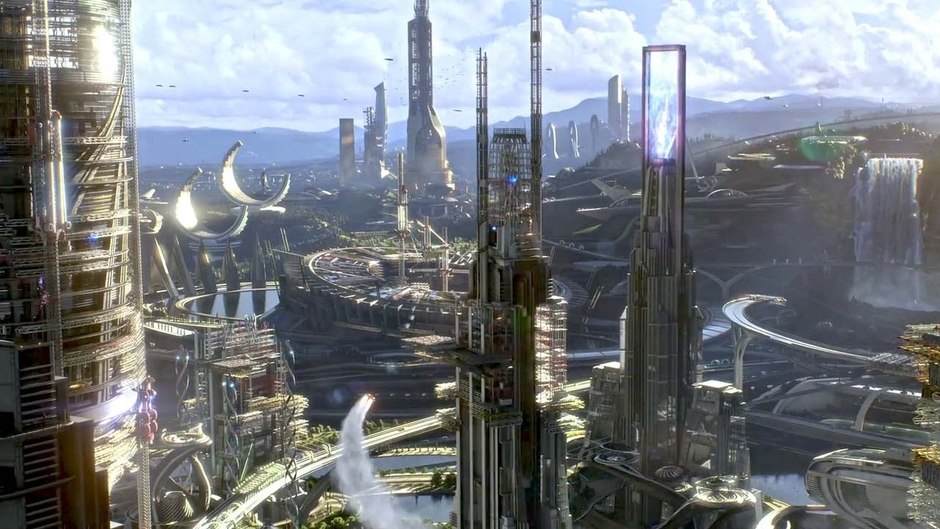
Thus, from the get-go, Incredibles 2 is a film that sees both its filmmaker and its audience chasing down their childhood. What makes the film so great though, is the way in which Bird utilizes this and weaves it into the film’s thematic core.
The central plot sees Winston Deavor, the wealthy head of a telecommunications company, looking to help supers step back into the spotlight. Upon meeting with Elastigirl, Frozone, and Mr. Incredible, he is able to tempt all of them into helping with his endeavor. Each of the characters in this scene is driven by their own nostalgia. Our heroes are driven to meet with him solely on the basis that he claims to be able to return things to the way they were, or as he phrases it, ‘make supers legal again’. Even Elastigirl, who is initially unsure of the plan, is brought fully on-board when the Deavors give her a new Elasti-cycle, a device that immediately incites memories of her youth.
Mr. Deavor’s intentions are also heavily rooted in his own nostalgia. His parents were killed years earlier when supers were made illegal because they called for the supers but no one came. By bringing back the supers, Winston sees himself as restoring balance to the world and doing right by his parents. Even Frozone notes to the Parrs that they should wear their old superhero outfits when meeting with Winston because he’s got a feeling he’s the “nostalgic type”.
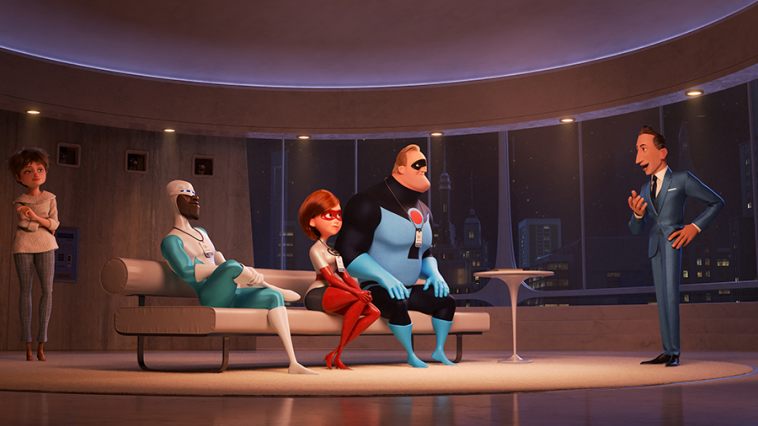
Each and every one of these characters are motivated by a desire to return to the way things were. Mr. Incredible wants to avoid going back to a desk job by being a super as his full-time job. Elastigirl longs for the opportunity to get back in touch with her younger self and not see herself as being defined by motherhood. Winston wants supers to come back, because it’s the way things were when he was a child and as a particularly nefarious character points out later in the film, supers were legal when his parents were still alive so he “conflates the two”. These motivations are not driven by a desire for progression, but rather a desire for regression. And this is expertly represented in the action of the film itself.
The three biggest setpieces in the film all have a simple thing in common; they are about stopping something. The opening sees the heroes trying to stop the Underminer’s drill from destroying city hall. The monorail setpiece sees Elastigirl trying to stop a runaway monorail. The finale sees everyone trying to stop the Everjust ship from crashing into the city.
In the first instance, things end poorly. The Incredibles and Frozone are able to stop Underminer’s drill but at a great cost. The Underminer escapes, the money from the banks is stolen, and the Incredibles are arrested for their deeds. In trying to halt the progression of the Underminer’s drill, they actually bring about more damage both to the city and themselves.
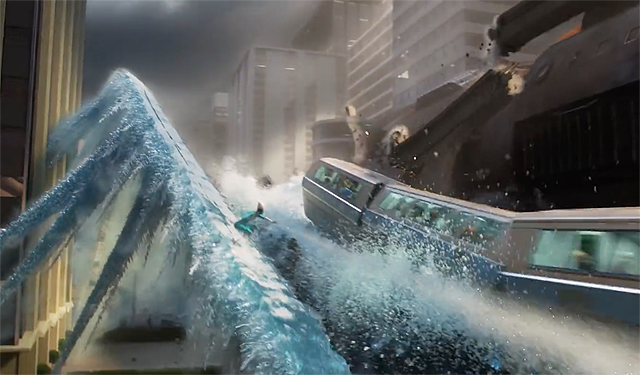
In the second instance, things get a bit more complicated. At the ribbon-cutting ceremony of a new monorail in New Urbem, something goes terribly wrong and the monorail leaves the station, going backward. This is the result of an act by the Screenslaver, which comes with its own layers of subtext. Arguably made famous by Disney parks, the monorail was famously referred to by Walt as ‘the skyway of tomorrow’. So to see Screenslaver quite literally using this tool for progress as a means of regression is a visceral and powerful moment.
The final instance continues this theme. The Everjust is a hyrdoliner, again a futuristic method of travel that represents progression. And again, Screenslaver redirects the ship, turning it fully around and aiming it straight at the city, turning its unstoppable progression into a weapon. It is here that our heroes realize that victory is not in stopping progress, victory is in embracing it. The ship does crash into the city, but it does so safely. Between the combined efforts of the Incredibles, Frozone, and all of the other supers, the ship simply skids to a stop amidst an avalanche-worth of snow. And it is here, for the first time, that the general public truly embraces all heroes once again, because of their willingness to progress.
Throughout the film, progress is what saves our characters. Staying at home with the kids takes a heavy toll on Bob until he visits Edna and opens his mind. It is only through being progressive and embracing his role as a stay-at-home father that he succeeds. Likewise, Violet is devastated to learn that all of Tony’s memories of her have been erased. Her efforts to try and jog his memory are fruitless, and it is only when she embraces the opportunity to forge new memories with him that they finally get to go on their date to the movies.
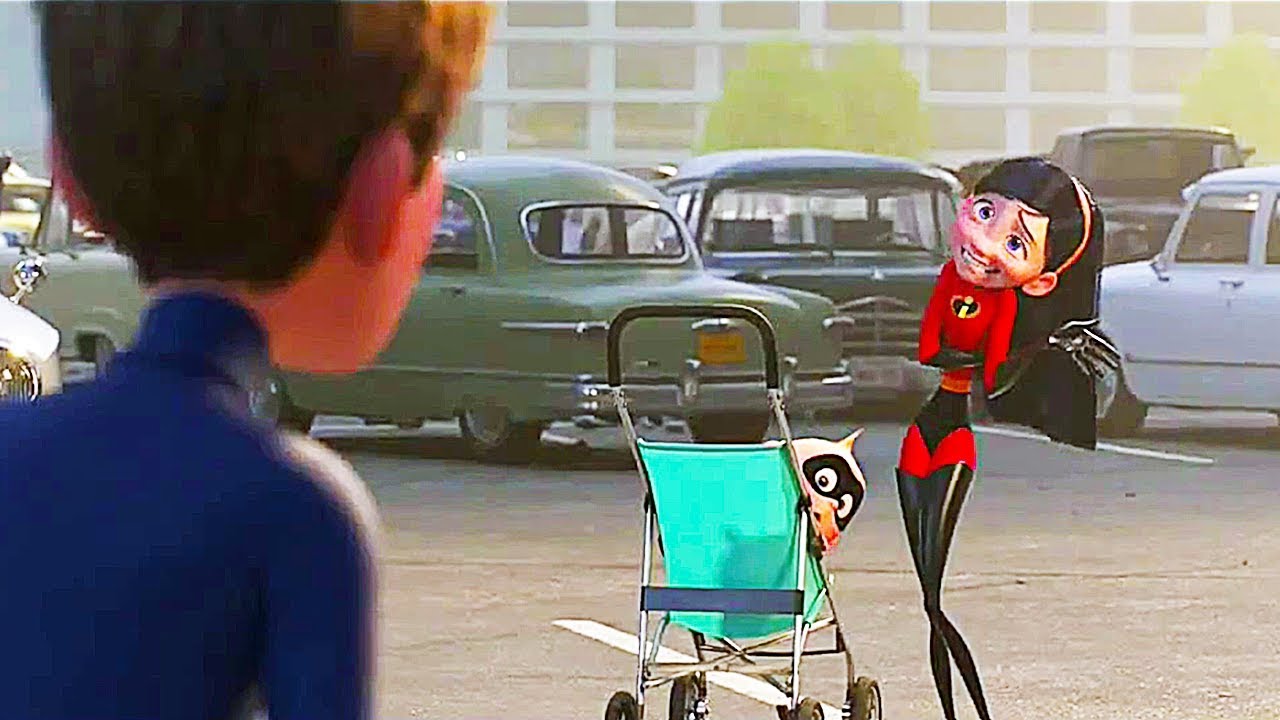
In the third act, when Mr. and Mrs. Incredible’s minds are taken over by Screenslaver, it is solely up to the children to save the day. The nostalgia and glory days mentality of the parents is turned against them, and it is only through their natural progression, their children, that they are able to overcome Screenslaver.
Speaking of which, Screenslaver is revealed to be Evelyn Deavor at the end of the second act. Just as Winston is driven by a sense of nostalgia surrounding the trauma of their parents’ death, so too is Evelyn. Where Winston blames the society that took supers away, Evelyn blames the supers themselves and what they did to society and her parents. Her goal as the Screenslaver is to use tools meant to further progress, such as screens, monorails, hydroliners, or even superheroes, and bastardize them so as to ruin people’s faith in them. Through her ranting and raving about the “weakness” of society though, she fundamentally underestimates the power of progress.
As Edna tells Mr. Incredible, Jack-Jack is so powerful because he is positively bursting with potential. As the baby of the family, he is the epitome of the potential of progress.
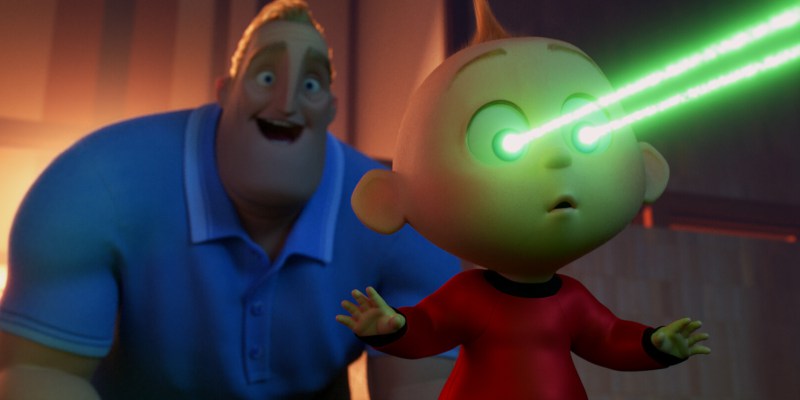
In Incredibles 2, Brad Bird has crafted an exquisite sequel that directly addresses some of his favorite themes in the most relevant way yet. The weight of being both a “cynic” and a “believer” in how the world progresses from here is felt throughout the film. To look at days gone by and wish that things could only be as great again is a fool’s errand, both in film and in real life. Hollywood is currently driven by nostalgia, but it’s only through embracing the progression of those properties that studios will ever forge something worth-while. And in the real world, trying to return a society or nation to a romanticized past era when things were ‘great’, is destined to end in failure.
Progress is key. And in a time where forces are actively attempting to regress society on a day-to-day basis, that message has never felt more timely.